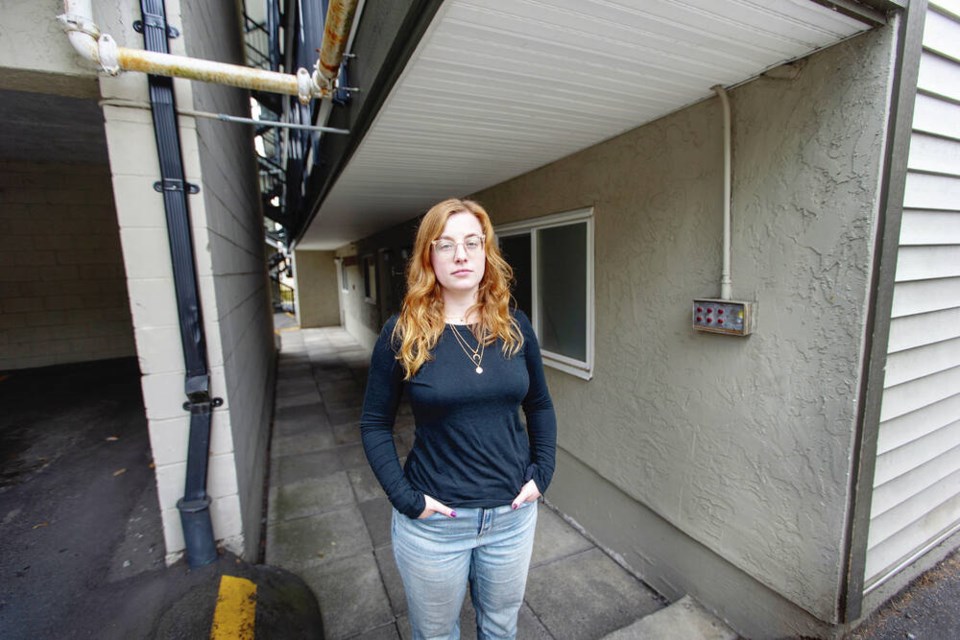Sarah Mitchell says just as COVID changed her life for the worse, a new long-COVID recovery clinic in Victoria is changing it back for the better.
“I’m painfully optimistic that this clinic will be the silver bullet,” Mitchell said Thursday.
Mitchell, 28, a communications officer for the B.C. government and a freelance writer, tested positive for COVID on April 19 last year, after her fiance. While her partner soon recovered and returned to work, Mitchell continued to struggle month after month. She was tired, anxious, breathless and required an inhaler.
Now, the Saanich resident has an option for specialized medical attention on the Island.
Island Health’s Post COVID Recovery Clinic at Royal Jubilee Hospital opened on March 1. It is the fifth such clinic in the province and is part of a network led by the Provincial Health Services Authority. It has already had more than 60 referrals.
“I got a call from the Royal Jubilee clinic two days after it opened,” said Mitchell, who had been getting telephone appointments through a long-COVID clinic in Vancouver.
“Honestly, since then, it’s been night and day in terms of recovery. Frankly, it is the best medical care I have ever received, it’s going so well.”
Patients at the clinic must be three months post initial COVID symptoms and be referred to the clinic by a physician or nurse practitioner. They do not need a positive PCR or rapid antigen COVID test to be referred or be attached to a family doctor. Once referred by a physician or nurse practitioner, in-person and virtual appointments are offered.
The clinic is not only helping some people return to full function, but it’s making an often misunderstood population feel heard.
Internal medicine physician Dr. Jessica Belle, medical lead for the post-COVID recovery clinic for Vancouver Island, said long COVID can present as incapacitating fatigue, brain fog, memory changes and insomnia, as well as shortness of breath or abnormal sensations in the chest that can’t otherwise be explained through testing or previous medical conditions.
Given there’s no test or template to prove patients have long COVID, such patients often first seek validation, said Belle.
“They feel invisible, they feel like their symptoms are not real, so we provide a place where they are validated and their experiences are understood and acknowledged — and that’s a really big part of it,” Belle said.
The Victoria clinic, open five days a week, is staffed by two internal medicine physicians and two family physicians “with significant experience in acute COVID and COVID therapeutics.” The doctors work two to three days a week, said Belle.
There are two full-time registered nurses, an occupational therapist, a physiotherapist, a social worker and a research assistant.
Long COVID can look different depending on the patient, but generally it can swing from a person experiencing severe symptoms and later returning to what they could do before “and for some people these symptoms have dramatically changed their lives and they no longer feel like themselves,” Belle said.
While long COVID is not fully understood, clinicians and researchers have gained a lot of knowledge around it over the past two years and that information is shared, she said.
The clinic offers classes on symptom management so that patients can learn how to regulate their fatigue and breathing, a re-introduction to exercise, and “very specific resources” collated by experts on long COVID, including videos, Belle said. “We are finding with our strategy people are improving dramatically over a course of months.”
In the early days of COVID, before vaccines, it was estimated 10 to 30 per cent of those infected developed acute or long COVID, symptoms that persisted three months beyond infection.
“That number has dramatically reduced with vaccination,” Belle said.
“I am very hopeful that we will see less people suffering from long COVID with more and more people being vaccinated.”
People “absolutely are getting better” following treatment or feeling better than they did before, she said.
Despite a shortage of both doctors and nurses, Belle said, many clinicians and allied health professionals were motivated to join the long-COVID clinic and see people through to a full recovery, or the hope of improving.
Instead of leaving the health care field or “leaning in to the burnout that we can all be feeling right now,” clinicians have thrown themselves into the clinic to “try and make a difference,” she said.
Mitchell said she has gained a lot from the group seminars and classes, talking to the doctors and occupational therapists.
“It’s been surprising how much the education is helping,” she said.
“Your body breathes incorrectly [with COVID ] so you have to manually override all these survival instincts your brain has taught you and re-learn to breathe.”
Mitchell hopes she can return to work in the summer. “My life changed overnight with COVID and I will definitely never be the same person I was before I got this illness,” said Mitchell.
ceharnett@timescolonist.com



